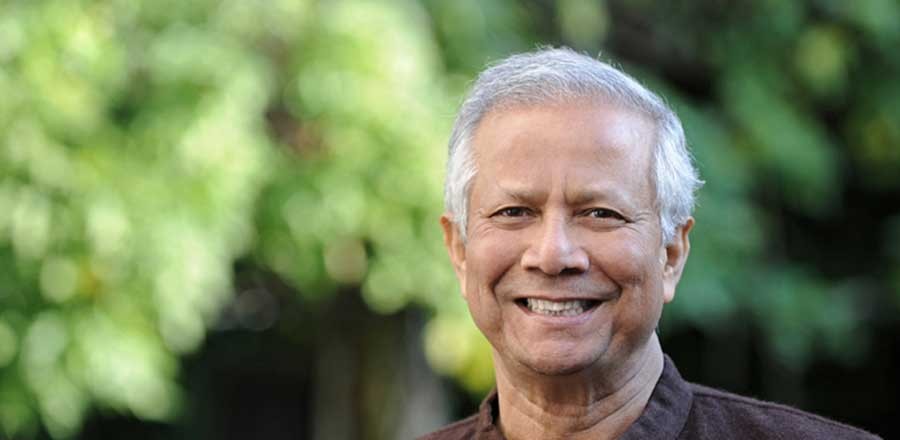Muhammad Yunus
February 10, 2017 | Expert Insights
Where is, society heading?
On 09 Feb 2017, Nobel Laureate Muhammad Yunus, Founder of the Gramin Bank and Chairman of the Younus Centre interacted with the Synergia Forum, at Bangalore.
He pointed out that the world’s eight wealthiest people had amassed more than the cumulative wealth of poorer 50% of the world’s population. The concentration of wealth in the hands of a fewer people is an increasing phenomenon and was unsustainable from an economic, social and political points of view. Signs of dissatisfaction were already visible in the political space, manifesting in anti-globalization, anti-immigration and trade protection sentiments. He opined that the anger of people, was finding vent in the BREXIT Referendum, the popularity of President Rodrigo Duterte of Philippines and the surprise defeat of US Presidential frontrunner Hillary Clinton.
The Nobel Laureate was not convinced that repressive measures like building a wall with Mexico, introducing curbs on immigration and imposing tariffs on imports, can remedy the reasons for people’s anger. The central challenge is that 99% of the world’s population is working to create wealth for a mere 1%. Dr. Yunus says the fault lies more with the machine for creating wealth, rather than the people who benefit from it. He likened the situation to a ticking-time bomb, saying there were two options for society; either let the situation play out and face the consequences or fix the problem.
While acknowledging that more needs to be done, Dr. Yunus said microfinance by empowering the poorer sections of society, mitigates some of the anger. Money lent to poor people can be returned in a successful business model. Financial services are the oxygen for society and the success of Gramin Bank and the Yunus Centre has demonstrated that poverty, unemployment and carbon footprints, can be holistically addressed and even eliminated. He calls this the three-end solution; zero poverty, zero unemployment and zero carbon emissions. He clarified that micro-credit is less about job creation and more about entrepreneurship. He specifically mentioned that women can become successful entrepreneurs even if they were undocumented or illiterate.
Striking a more philosophical note, he said human beings were not born to work for other human beings. He believes that employment should be replaced with entrepreneurship. Education should be redesigned to encourage more creative thinking and the youth should be more keen to become job creators, rather than just employees.
Assessment
Last year in Taiwan, Foxconn, manufacturers of iPhones, replaced 60,000 employees with robots. With the rapid advances of robotics and artificial intelligence (AI) in manufacturing, human labor is fast getting replaced. Another major revolution is expected with autonomous driving, which is expected to render unemployed millions of human drivers across the globe. Dr. Yunus eloquently articulated the threat to society and predicted a bleak future for human employment. Will micro-credit and social business be able to redesign the wealth creation system that causes so much disparity? Dr. Yunus himself says that micro-finance can only become a small effort, to address the humungous economic challenge human beings are beginning to face.
If robotics and AI successfully replace human labor, while unemployment is an obvious downside, there may be some benefits as well. Mankind could find themselves at the threshold of unprecedented wealth, easily created by an army of robots who work with machine efficiency, needing no breaks and at virtually no cost. With abundance of easy wealth, the power, prestige and greed humans find in its possession, may lose much of its’ sheen. In such an eventuality progressive (democratic) societies may be more willing to share it more equitably amongst their people.
In 1943, Abraham Maslow proposed the hierarchy of human needs, in a paper titled, ‘Theory of Human Motivation’. He identified five progressive levels of human needs; starting from Physiological Needs (food, shelter, clothing), Safety, Love & Belonging, Esteem and finally to Self-Actualization. In a future world, Physiological and safety needs could become basic human rights (Guaranteed by governments) and mankind could become more engaged with love, esteem and self-actualization. Wistful thinking? Perhaps but there is no crime in being an optimist.


